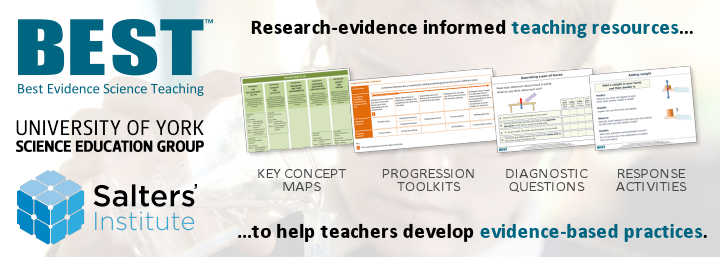Best Evidence Science Teaching (BEST)

The best teaching draws on the best evidence.
Despite high-level calls for evidence-based practice in classrooms, science teachers’ lives are so busy that it is hard for them to access and effectively implement the best principles emerging from education research.
Best Evidence Science Teaching (BEST) is a major research-informed curriculum development project, which aims to transform science education research into practise by making research-informed, open-access resources freely available to science teachers.
Research evidence-informed progression toolkits for key concepts in secondary school science (age 11-16) provide:
• appropriately-sequenced steps for learning progression
• diagnostic questions that provide evidence of learning and of common misunderstandings
• response activities that challenge misunderstandings, promote metacognition and encourage conceptual progression
The resources are being developed by the Unviersity of York Science Education Group from the best available research evidence on common misunderstandings in science, effective diagnostic questioning and formative assessment, constructivist approaches to building understanding, and effective sequencing of key concepts.
The Salters' Institute has been proud to fully fund the BEST project since it began in 2016. The Institute of Physics is now a co-funder of BEST, having supported the project since 2021.
What's BEST?
Best Evidence Science Teaching (BEST) aims to build a bridge between research in science education and teaching in school science lessons, by developing resources that draw on robust research findings.
The Education Endowment Foundation’s 2018 guidance report Improving Secondary Science cites Best Evidence Science Teaching (BEST) as a good source of diagnostic questions and activities that promote metacognitive talk and dialogue.
Downloads:
Updates
Publication of resources
Teaching resources are being developed based on careful consideration of the best available research evidence. All resources for age 11-14 have now been published. Resources for age 14-16 are being published on a topic-by-topic basis throughout 2021 and 2022.
Sign up for BEST email updates or follow @BestEvSciTeach on Twitter to find out when new topics have been made available.
Evidence of impact
Our evaluation of the resources in use in schools suggests that the research summaries and approaches described by the BEST resources act as miniature episodes of self-directed professional development for teachers, which can lead to immediate changes in practice during planning and during lessons.
We have observed teachers using the BEST resources to develop their practices in all seven of the areas identified by the EEF Improving Secondary Science report.
An open-access paper describing our findings was published in the December 2020 issue of School Science Review.
The success and impact of the BEST project was recognised with an invited keynote lecture at the Association for Science Education annual conference in 2020.
Project Team
Judith Bennett
Project Director
Helen Harden
Joanna MacDonald
Project Administrator
Tel: +44 (0) 1904 322601
uyseg@york.ac.uk








